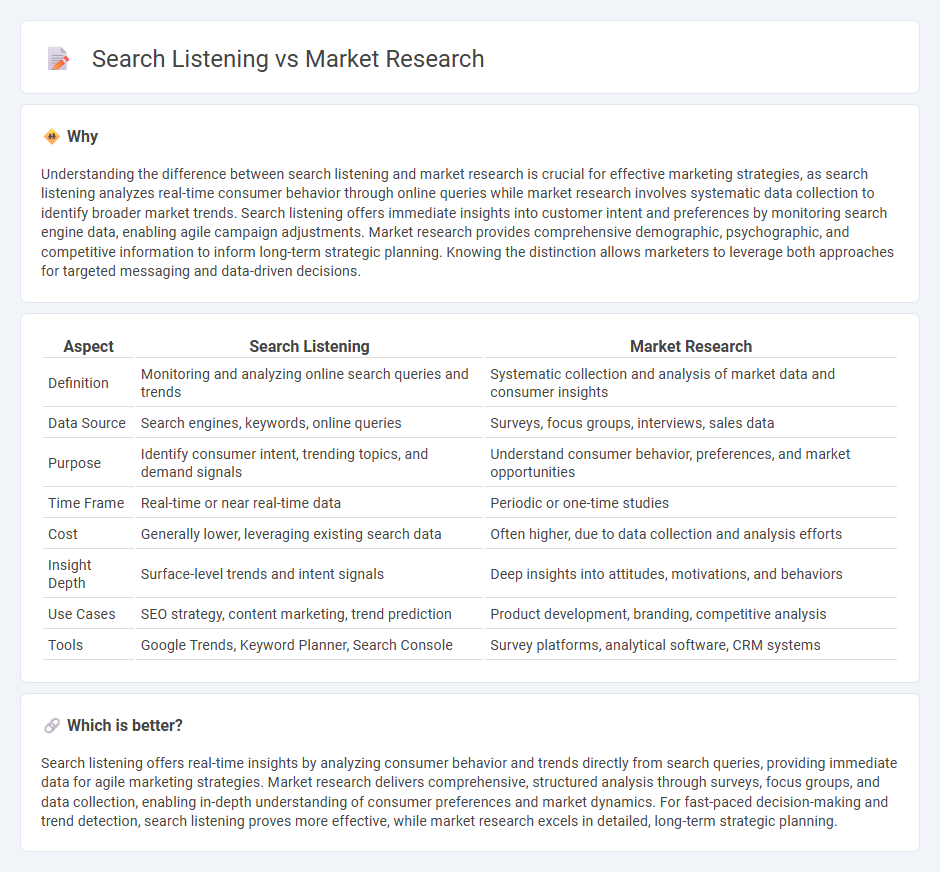
Search listening captures real-time consumer conversations and behaviors across digital platforms, offering immediate insights into trends and preferences. Market research involves structured data collection and analysis to understand broader market dynamics, consumer needs, and competitive landscapes. Explore the differences between search listening and market research to optimize your marketing strategies effectively.
Why it is important
Understanding the difference between search listening and market research is crucial for effective marketing strategies, as search listening analyzes real-time consumer behavior through online queries while market research involves systematic data collection to identify broader market trends. Search listening offers immediate insights into customer intent and preferences by monitoring search engine data, enabling agile campaign adjustments. Market research provides comprehensive demographic, psychographic, and competitive information to inform long-term strategic planning. Knowing the distinction allows marketers to leverage both approaches for targeted messaging and data-driven decisions.
Comparison Table
| Aspect | Search Listening | Market Research |
|---|---|---|
| Definition | Monitoring and analyzing online search queries and trends | Systematic collection and analysis of market data and consumer insights |
| Data Source | Search engines, keywords, online queries | Surveys, focus groups, interviews, sales data |
| Purpose | Identify consumer intent, trending topics, and demand signals | Understand consumer behavior, preferences, and market opportunities |
| Time Frame | Real-time or near real-time data | Periodic or one-time studies |
| Cost | Generally lower, leveraging existing search data | Often higher, due to data collection and analysis efforts |
| Insight Depth | Surface-level trends and intent signals | Deep insights into attitudes, motivations, and behaviors |
| Use Cases | SEO strategy, content marketing, trend prediction | Product development, branding, competitive analysis |
| Tools | Google Trends, Keyword Planner, Search Console | Survey platforms, analytical software, CRM systems |
Which is better?
Search listening offers real-time insights by analyzing consumer behavior and trends directly from search queries, providing immediate data for agile marketing strategies. Market research delivers comprehensive, structured analysis through surveys, focus groups, and data collection, enabling in-depth understanding of consumer preferences and market dynamics. For fast-paced decision-making and trend detection, search listening proves more effective, while market research excels in detailed, long-term strategic planning.
Connection
Search listening leverages data from consumer queries and online behaviors to identify emerging trends, which directly informs market research strategies. Market research uses insights gathered through search listening to refine target audience profiles and optimize product positioning. By integrating search listening, companies enhance their market research accuracy, driving more effective marketing campaigns.
Key Terms
Consumer Insights
Market research employs structured methods such as surveys and focus groups to gather quantitative and qualitative data on consumer behavior, preferences, and market trends. Search listening leverages data from online search queries and social media to capture real-time consumer sentiments and emerging interests, offering deeper insights into customer intent and needs. Explore more to understand how these approaches complement each other in delivering comprehensive consumer insights.
Data Collection
Market research primarily collects structured data through surveys, interviews, and focus groups to understand consumer behavior and market trends. Search listening gathers unstructured, real-time data from social media, forums, and online searches to capture consumer sentiment and emerging topics. Explore how integrating both methods can enhance your data collection strategies and market insights.
Social Listening
Market research provides structured data from surveys and focus groups to gauge consumer behavior, while social listening captures real-time insights by monitoring social media conversations and trends. Social listening enables brands to detect emerging issues, measure sentiment, and track competitor activity across platforms like Twitter, Facebook, and Instagram. Explore how integrating social listening with market research can elevate your brand's strategy by diving deeper into audience engagement analytics.
Source and External Links
Market research - Market research is the systematic gathering, analysis, and interpretation of information about target markets and customers to support decision-making and business strategy.
Everything You Need to Know About Market Research - Market research involves collecting and analyzing data about your target market, competitors, and industry to uncover customer needs, identify opportunities, and mitigate risks.
Using Gen AI for Early-Stage Market Research - Generative AI can augment early-stage market research by quickly generating and testing product ideas, but it should complement, not replace, traditional research methods that involve real human feedback.
 dowidth.com
dowidth.com